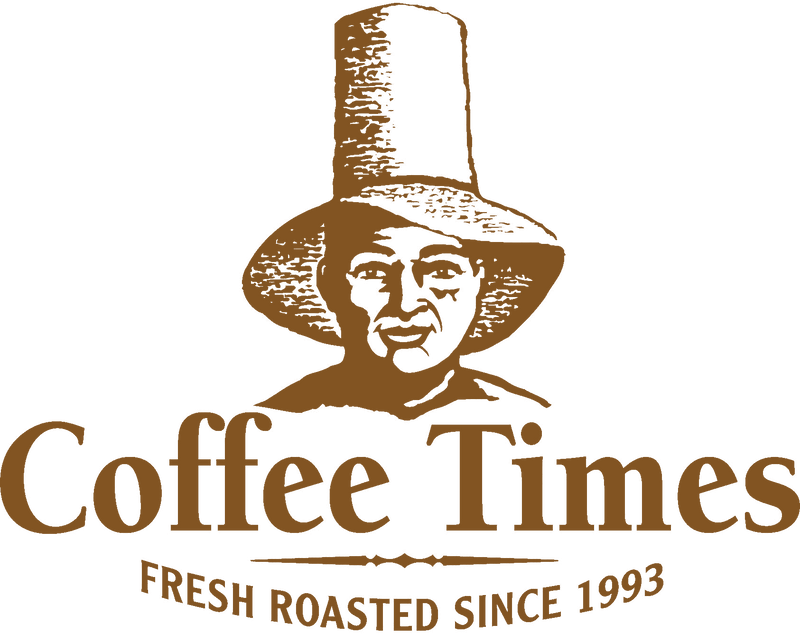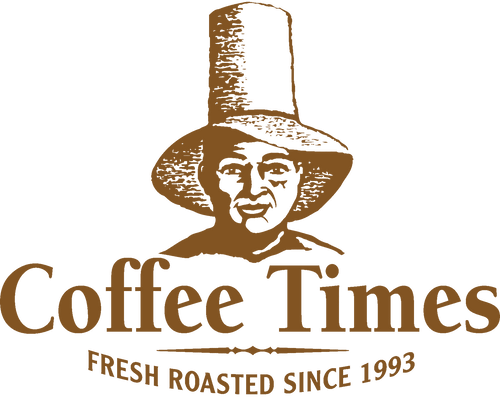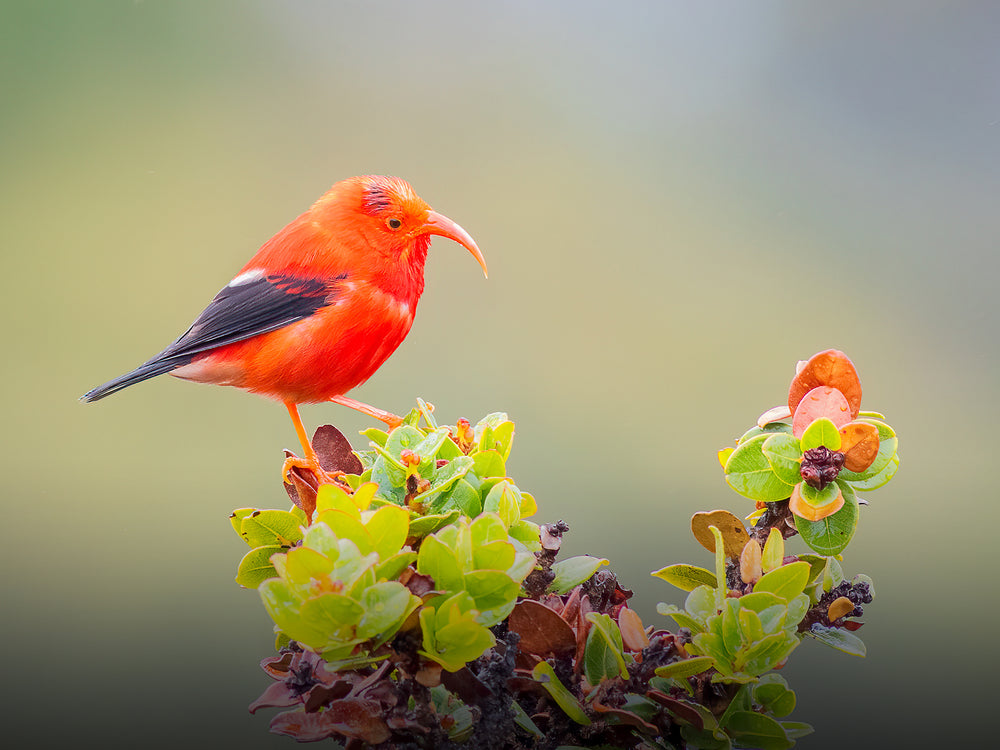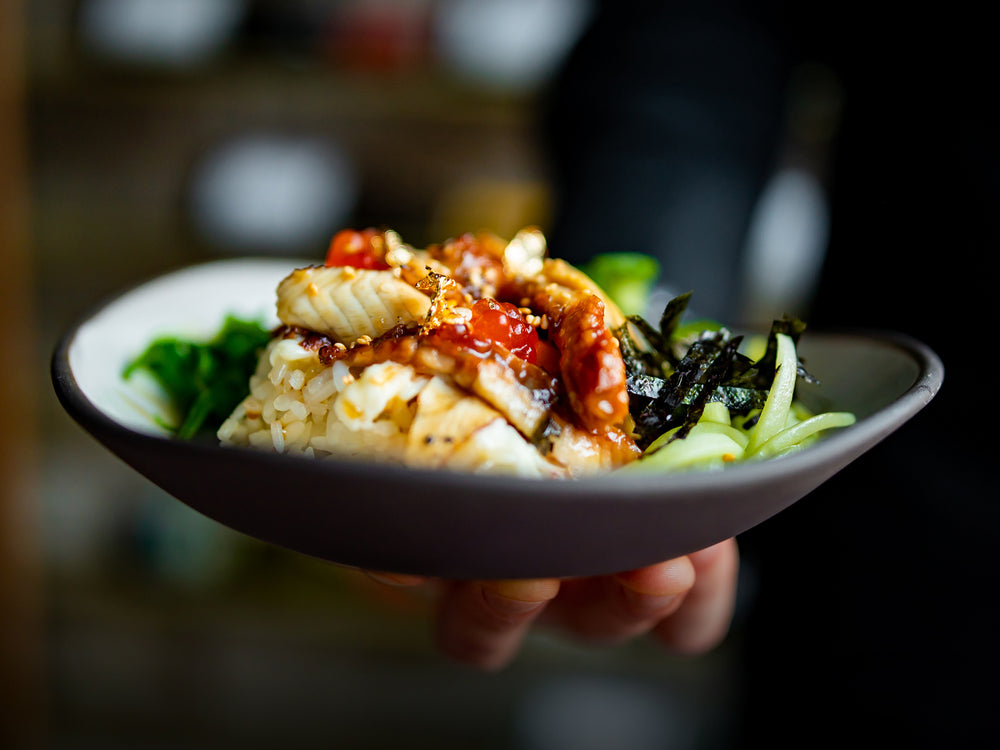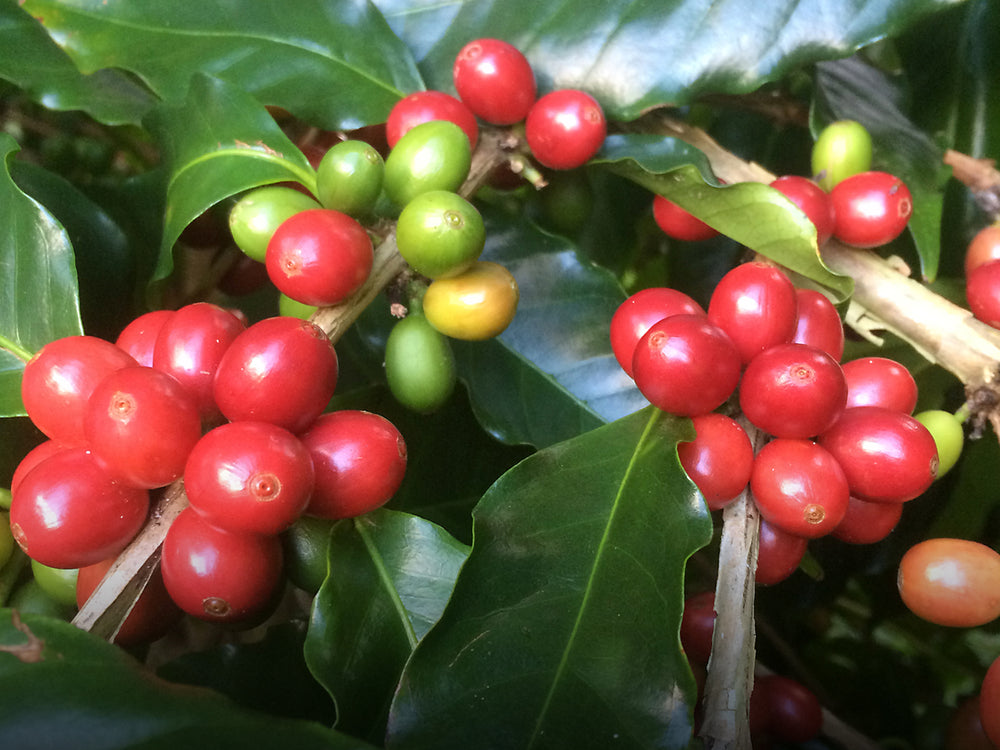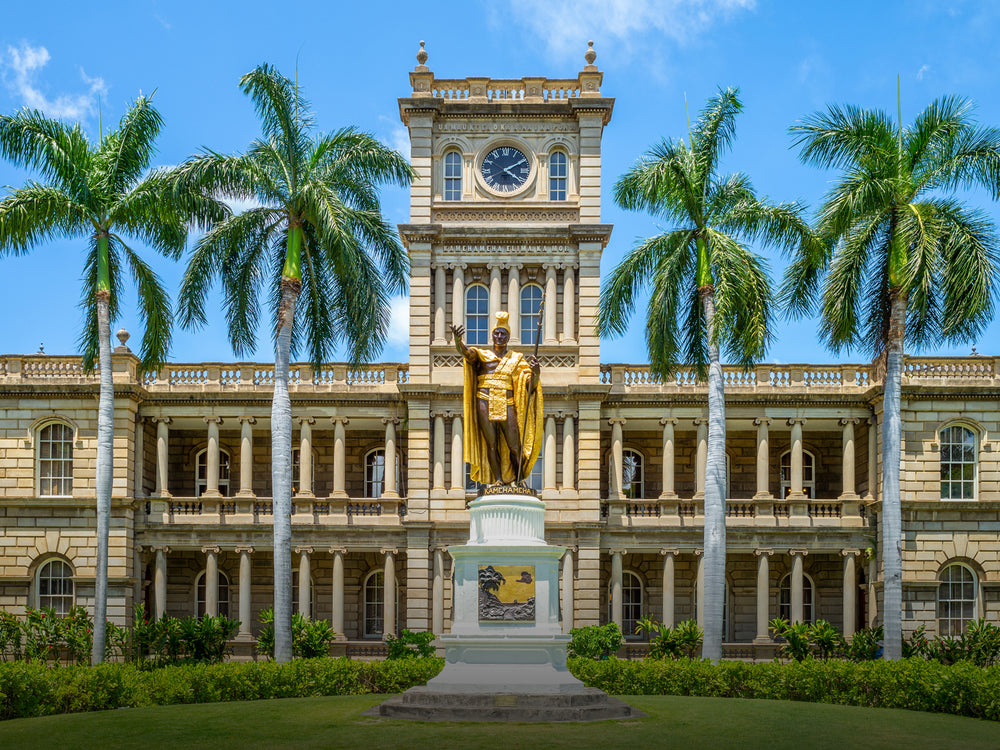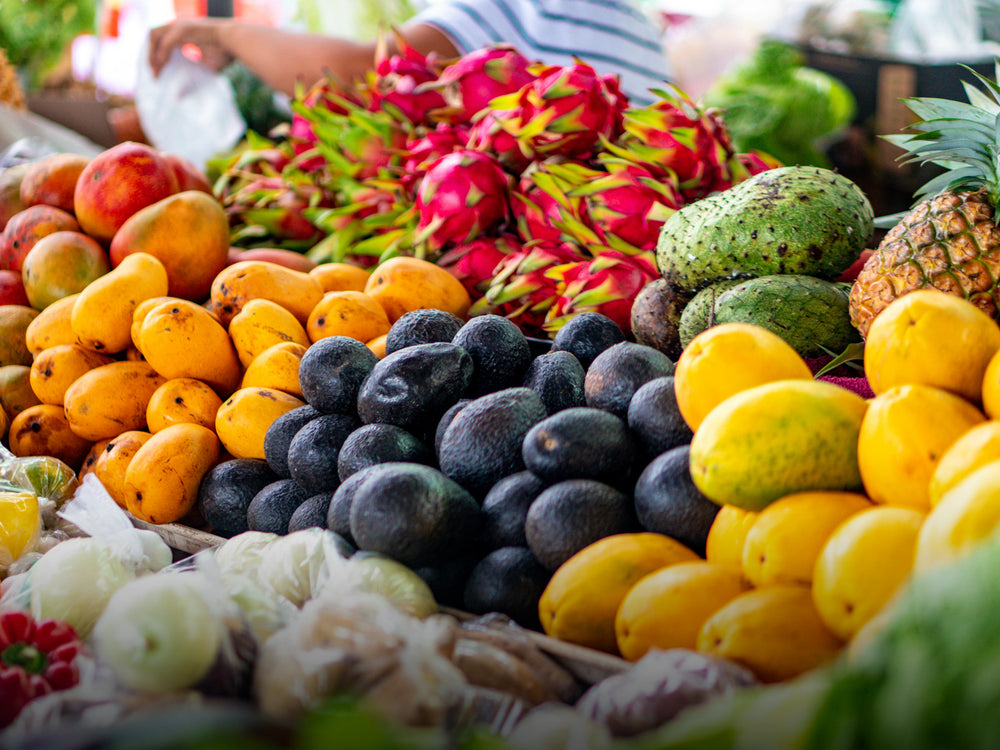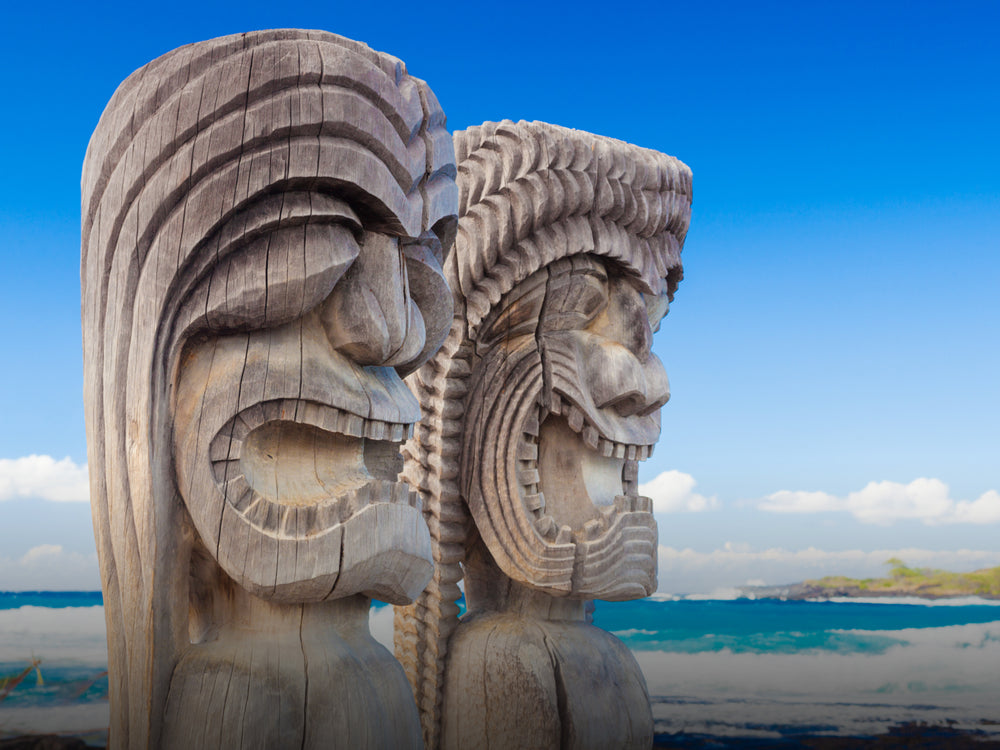My New Adventure in Coffee
by Les Drent

Les Drent (right) owner of LBD Coffee and George Alfiler (left) planting the first crop of organic coffee in Kauai. Blair Estate Coffee will be available to the public in 2003.
As I hover over my young coffee trees, I think back nine years when I issued the first edition of Coffee Times magazine. At that time specialty coffee was just sinking its roots into American culture. Within two years of the first printing I bought a coffee roaster and packaged and sold my first pound of 100% Kona coffee.
I have witnessed many changes in the coffee industry in Hawaii since I came here. Before 1990 Kona coffee was used mostly as a master blend to make other coffees of lesser quality taste better. Coffee prices were low, very low. In most cases it was not worth an individual’s effort to harvest their coffee, leaving many farms in Kona in disrepair and overgrown with weeds. Those that did harvest their coffee sold their crop to a handful of mills that monopolized Kona coffee and even its name.
Today by sharp contrast one can find personal coffee tours on family farms, elaborate and very informative internet sites selling 100% Kona coffee, and coffee estates that would impress any Napa Valley wine proprietor. Today's self-autonomous industry provides a livelihood for over 600 farmers in Kona, and acreage devoted to coffee continues to grow annually. When I realized how well the Kona coffee industry was doing and how strong the foundation appeared to be for success long into the future I turned my thoughts towards finding the next frontier for great coffee.
Old abandoned coffee pulper in Hanakapi’ai valley.
My search led me to the northern most island of Kauai. During my first year there I hiked into the mountains in search of coffee trees that have been growing in a wild and natural state since their planting in the 1800’s. All of these trees are of the typica arabica style, which are the same as those trees growing in Kona. It is believed by some historians that some of the trees now growing in the wild in Kauai are the ancestors of those growing now in Kona. In the valley of Hanakapi’ai along the Napali coast of Kauai the remains of an old coffee pulper still lie on the ground along side a trail that is accessed only by a steep and rocky one hour hike by foot. No roads have ever been laid in this area of the island. More evidence that coffee was cultivated in this area are the natural platforms carved into the earth along the valley walls. The ground there still support’s the thousands of coffee trees that grow wild under the lush jungle canopy.
After picking and hiking out with several small loads of coffee beans from this and several other remote and wild sites around the island, I processed the coffees by hand. This included pulping, fermenting and sun drying the beans. After several weeks of drying, the coffee was ready to be dry hulled, roasted and cupped. I discovered that tastes varied from one location to another, demonstrating once again that it is all about the growing environment as well as the type of coffee you grow.
The taste from one particular location (I will not reveal its whereabouts) was exquisite. That cup of coffee was heavenly and had a flavor I have not tasted before. Somewhat resembling the deep chocolate nuances of a great Guatemalan coffee, it had the body to match the Kona coffee that I still regard as the finest cup of coffee in the world. The after taste was without bitterness and the finish lingered long enough to leave you appreciating just one cup. Good thing because I was in limited supply of that precious bean. I believe that this great tasting coffee was the result of the very aged and humic soil that exists on this island. Kauai is the oldest island in the Hawaiian chain. I also noticed that the amount of sun and rain in this particular spot seemed to compliment the coffee growing there.
Needless to say this particular discovery sparked an uncontrollable urge and interest in growing coffee in Kauai. Finding a location nearest the best cup of coffee I tasted was not easy, but within two years time I settled on a piece of land that mirrored the conditions of that area. Set back at the base of Mt. Wekiu and located at the foot of the Makaleha mountains along the eastern side of the island, I found a piece of land where the soil had been untouched for nearly half a century and receives an equal amount of sun and rain. In the distance is Mt. Wai’ale’ale which is coined the world’s wettest spot.


In 6 months the landscape at Blair Estate on the island of Kauai was transformed from the wild into an organic coffee farm.
Clearing the overgrown land was an adventure in itself especially dealing with an undergrowth of hau bush and Christmas berry. Careful to leave a host of old trees to partially shade my coffee and paying careful attention to the guidance of expert Kona coffee grower George Yasuda, I laid out and planted my first acre of coffee. I started using coffee grown from seed from proven stock in Kona. I also chose to go against the grain of commercial coffee cultivation and opted to grow organically in an attempt to utilize what nature has provided on its own and what I believe has led to the exceptional taste of coffee I found growing in the wild on Kauai. As an experiment I have also started from seed the coffee I discovered in my secret spot. Taken from the wild I am attempting to cultivate this unknown strain on my farm.
Six months into my venture my trees range from two to three feet tall and show healthy growth. Plans for a complete coffee mill/roasting facility as well as farm tours are tentatively scheduled for the Fall/Winter of 2003. It will be the first small independent organic coffee farming venture of its kind in Kauai, and I look forward to entertaining the coffee loving public for years to come. A web site will be coming soon so interested people can follow the progress and growth of my coffee farm, Blair Estate Organic Arabica Kauai Coffee.
Readers may submit editorial comments to any of our stories by sending an email to les@lbdcoffee.com. We would be happy to attach your comments and feedback to anything we publish online. Thank you for your interest.
Story appeared originally in Coffee Times print magazine and appears online for archival purposes only. Any use or reprinting of these stories without the expressed written consent of the author is prohibited.
